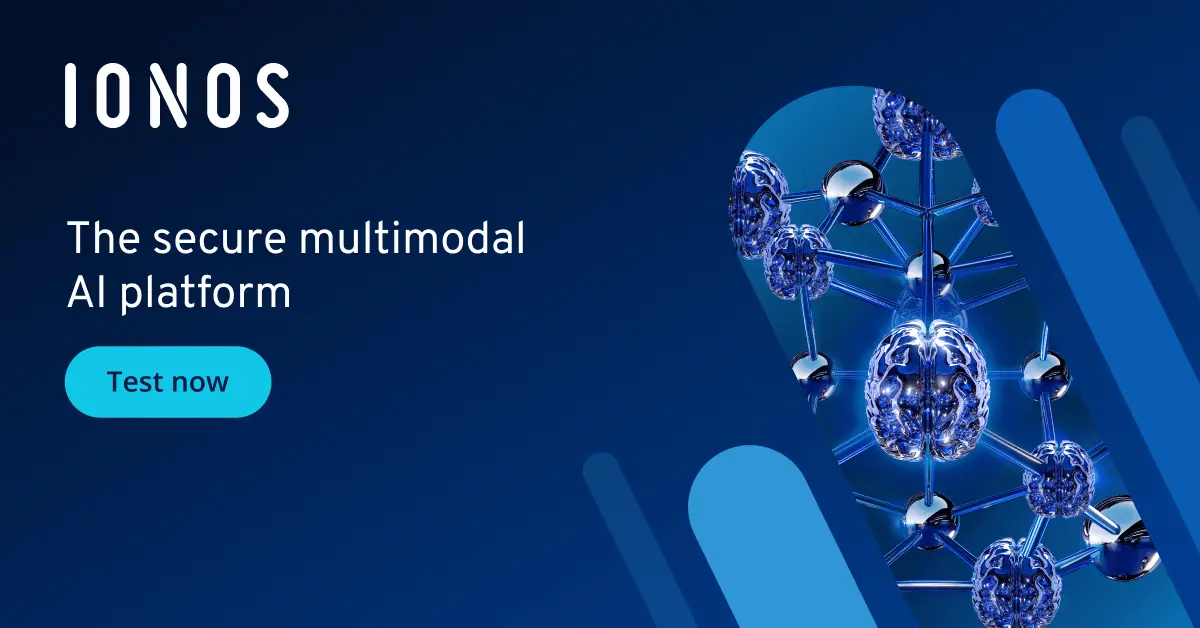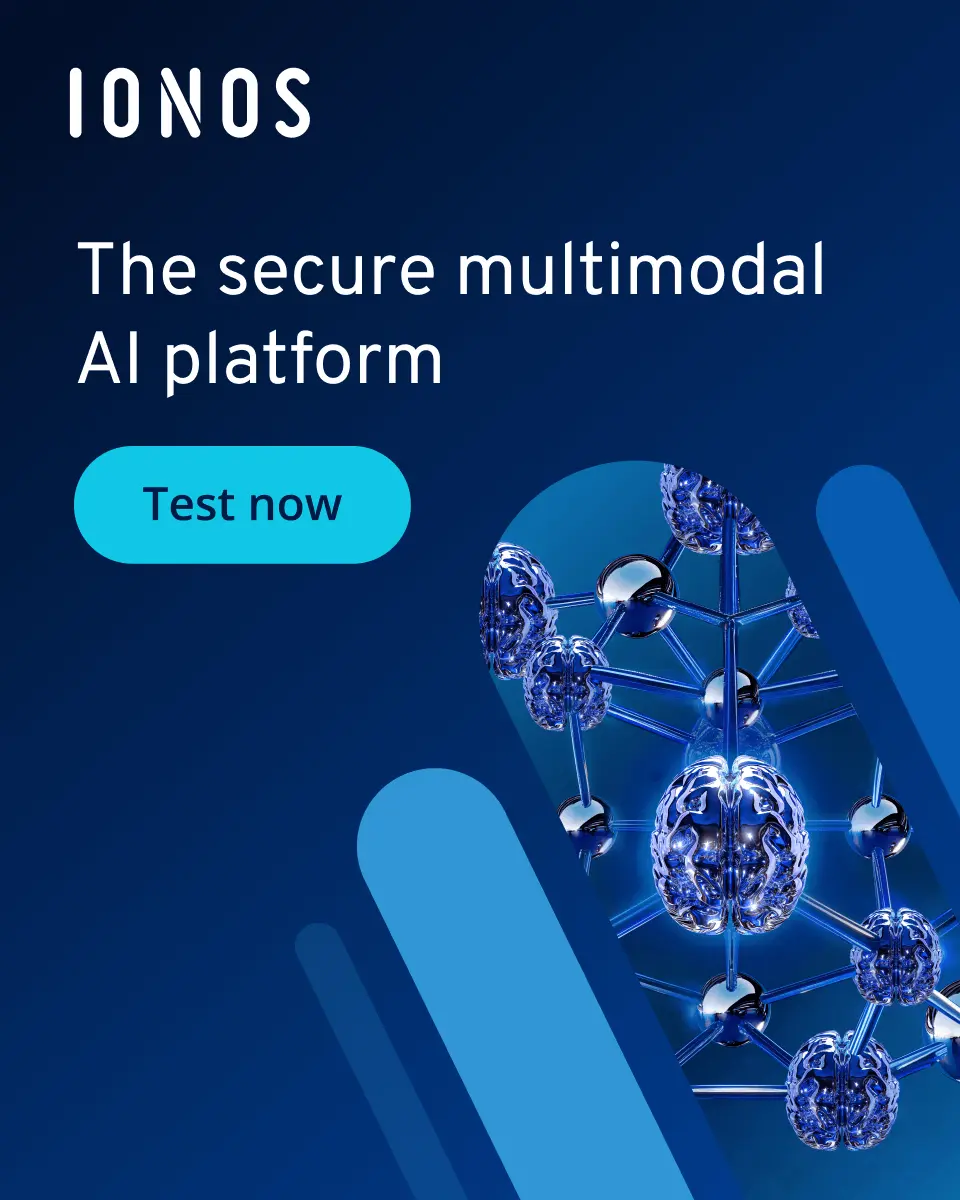What is an AI platform?
Artificial intelligence platforms make it possible to develop and optimise models for machine learning (ML). Important features of AI platforms include scalability, automation, MLOps and generative AI. They support users in making data-based decisions, streamlining processes and effectively using AI tools.
What is an artificial intelligence platform?
An artificial intelligence platform (or AI platform) is an integrated set of technologies for developing, training and implementing machine learning and deep learning models. AI platforms provide tools and infrastructure for developing and maintaining complex AI applications. They can help centralise data analysis, make development and production processes more efficient and improve collaboration between departments. That in turn allows development teams and companies to implement AI-based solutions with lower costs and fewer resources.
In our guide ‘Deep Learning vs Machine Learning’ we explain the differences between these two sub-fields of artificial intelligence.
What are the different kinds of AI platforms?
Companies have three main options for using an artificial intelligence platform, each with its own advantages. While pre-configured AI platforms allow you to get to work quickly, self-developed or user-defined solutions are much more customisable. Alternatively, open-source AI platforms provide a flexible foundation for beginners and more complex projects alike.
Pre-configured AI platforms
Pre-configured AI platforms are perfect for companies looking for a quick and easy way to implement AI apps, models and algorithms. They offer a wide range of ready-to-use tools, APIs and pre-tested algorithms. Sometimes they also include pre-trained models for specific use cases, which you can integrate seamlessly into your existing workflows.
Pretty much every major cloud service provider offers an AI platform – from AWS SageMaker (Amazon) to Google Cloud AI to Microsoft Azure AI.
User-defined AI platforms
Developing your own AI platform could be the right option for you if you have specific requirements, such as strict data protection rules or special use cases. User-defined AI platforms are customised from start to finish, so they can meet your individual needs. For example, Uber developed its own AI platform that uses natural language processing (NLP) and machine vision to improve its GPS system and crash detection features.
Building a custom platform takes more time and resources, because maintenance, support and administration need to be done entirely in house. In return, you’ll benefit from maximal control and flexibility.
Open-source AI platforms
Open-source solutions like TensorFlow and PyTorch offer an affordable way to benefit from AI. In fact, they are often free. Active communities ensure that open-source platforms are being constantly developed, especially in the case of popular tools and frameworks. Open-source platforms are a particularly good option for companies looking for a flexible and customisable solution.
- Get online faster with AI tools
- Fast-track growth with AI marketing
- Save time, maximise results
What is the purpose of AI platforms?
AI platforms provide support with a variety of tasks, from data processing and analysis to workload distribution to developing machine learning models. Their most important features fall into two categories, MLOps and generative AI:
-
MLOps: Machine learning operations (MLOps) aim to optimise the use and maintenance of AI models. They use, for example, automated machine learning, visual modelling, dashboards for presenting results and automated development (AutoAI). They also enable you to generate synthetic data for training AI models.
-
Generative AI: Generative artificial intelligence is based on training with large data datasets (Big Data), which are analysed by neural networks and deep-learning models. It is used for text and image generation, data expansion and extraction, classification automation, as well as in dialog-based AI such as chat bots.
Other features of AI platforms include:
- Automation: Machine learning makes it possible to automate processes, which speeds up workflows.
- Scalability: AI models can be trained and used in a wide variety of environments, thanks to centralised workflows.
- Seamless integration: Modern AI platforms support common languages and frameworks, and can be integrated into open-source software and your entire tech stack.
- Increased security: AI platforms have various security measures in place to ensure that data, identities and application endpoints are adequately protected.
- Improved governance: AI systems enable the central control of data, models and processes, which makes it easier to efficiently uphold security, compliance and quality standards.
- Technical support: Many preconfigured AI platforms come with comprehensive support, including onboarding and training resources and help with problems. If you choose an open-source tool, look for one that provides support for AI features and architectures.
- 100% GDPR-compliant and securely hosted in Europe
- One platform for the most powerful AI models
- No vendor lock-in with open source
What are the use cases for AI platforms?
An increasing number of companies are turning to AI platforms to stay competitive or create competitive advantages. Product development and services are two of the most common areas AI platforms are used in. Specific use cases include:
- Financial services: AI models are used by credit institutions to automate credit checks, prevent money laundering and detect fraud in real time. AI is also used in receivables processing.
- E-commerce: Online stores use AI platforms to show customers tailored product suggestions and to optimise pricing and the purchase of goods.
- Healthcare: AI is transforming medicine, enabling faster diagnoses and increased access to patient services. That enables medical professionals to make more precise diagnoses and offer more individualised treatment.
- Production: AI technology is used in manufacturing to optimise (supply chain management) and improve quality control.

